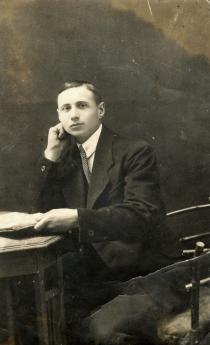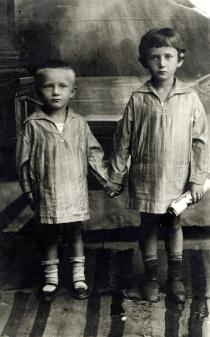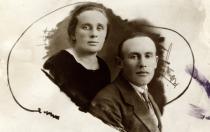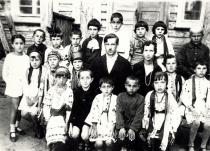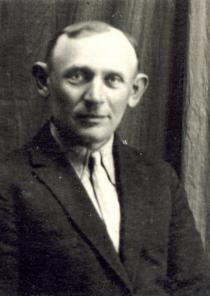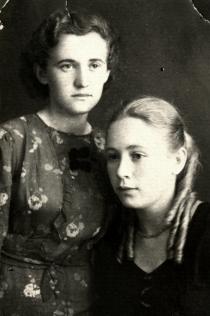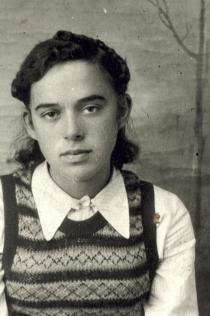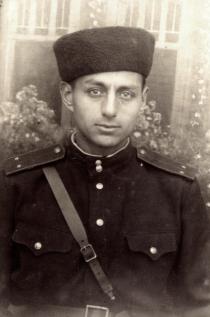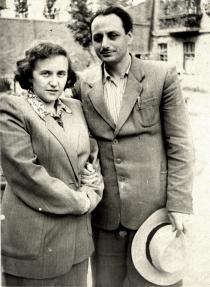
Maria Reidman
Kiev
Ukraine
Interviewer: Zhmyr Oksana
Date of interview: June 2002
I was born in Olevsk, a Jewish town, on 15th October 1922. It’s a picturesque town. It stands on both banks of the Ubat River, on the Pripyat tributary. The water in this river was red and soft and people came to rinse their laundry in it, even in winter. The banks of the river are steep and very beautiful. There was also a little ‘island of love’ in the river, where young people used to travel to on boats keeping it a secret from their parents. There were woods on the outskirts of town. The railroad crossing the town was a good opportunity for the development of the timber industry. Timber was mostly shipped to Germany by railroad. Trees were cut in strict accordance with the rules at that time. There was a big forestry in Olevsk. There were many wells in the town named after the people that had done the digging. If someone said, ‘Go fetch some water from the Leizer well!’, that meant to get water for cooking. Water from Mirrah’s well, on the other hand, was for washing. Tea again was cooked with water fetched from Ivan’s well. Ivan was a rich farmer. He had a big farm, garden and pastures. The water in his well was crystal clear and very tasty.
All Jewish towns were overpopulated at the time. People lived in wooden houses, and there was a fire every year. The center of the town was a little bit more spacious. Wealthier people lived there. In our neighborhood the houses were almost adjusted to each other. Farmers lived on the outskirts because they were afraid of fires. The market was a place of interest in Olevsk. Sunday was a very important day: People came to sell their products. The majority of the people was far from wealthy, but the Jewish community was there to support the needy families.
There were four synagogues in Olevsk: two Hasidic 1 ones and two others. My father and grandfather went to the Stolynskaya synagogue. There was one common synagogue for poor people. Another synagogue – a three-storied brick building – was built at the beginning of the 19th century for wealthier people living in the center of town. There were many Polish people in Olevsk, and they went to a nice cathedral. It was destroyed in 1932-33. A story was told in Olevsk that when they pulled down the cross and the bells the sound of it could be heard as far as Kapischi, almost 40 kilometers from Olevsk at the border with Belarus. The church survived the war. It was built in the 15th or 16th century on a hill and it compliments the town well. The priest of this church was on friendly terms with the Jews. It was a tradition in Olevsk to walk along the central street on Saturday. People came back from the synagogue, had lunch, left the dishes unwashed – it wasn’t allowed to wash dishes on Saturday – had a nap and then went out. Those who lived in the center were sitting on the porches looking at the passers-by. People were friendly in Olevsk. All disputes were resolved either by the rabbi or another respectable Jew.
My maternal great-grandfather’s name was Iosif Gelenrod. He came from Poland. He was born in the first half of the 19th century. He owned two mills, farmland and stores in Olevsk. But his manager whose name was Lerner, a Jew, robbed him very skillfully, and my great-grandfather had nothing to leave to his children. He got married to a very pretty young girl. Her name was Haya. She gave birth to three sons and six daughters. She died when she was in her late forties.
I only know about some of the children of my maternal great-grandmother. Boruh Gelenrod studied in cheder and was an educated man. He worked as a quality assurance specialist in the forestry in Olevsk. He became so good at his profession that he published a timber manual along with two German Jews. This was before the Revolution of 1917 2. Quality assurance specialists and other forestry employees were in the higher hierarchy in Olevsk – they had better earnings and supervised all work processes at the forestry. Boruh was born around 1865 and died after World War II at the age of about 90.
I also know a little about another brother of my grandmother. His name was Haim Gelenrod. My grandmother told me that he was an intelligent and famous man in Olevsk. People respected him so much that they turned to him to resolve their disputes.
My grandmother was born in Olevsk in 1868. Her maiden name was Tema Gelenrod. She married Peisah Roizberg from Medvedovo village [Zhytomir region]. His father was a wealthy man whereas my grandmother’s family was poor at that time.
My grandfather was born in Medvedovo in 1870. Medvedovo was a Polish village. The population was mostly Polish; there were only a few Ukrainians and even fewer Jews. My grandmother told me that everybody liked her father-in-law. His name was Yankel Roizberg, and he was a respectable man in his village. He had three daughters and one son, my grandfather. His children didn’t get any education because there was no cheder in the village. My great-grandfather was a cattle dealer and owned a small pub. My grandfather Peisah was in the business with his father. The Roizberg family wasn’t very religious. They didn’t follow the kashrut and didn’t pray at home every day. They only celebrated the most important holidays. They celebrated Sabbath, New Year, Pesach and Yom Kippur. They went to the synagogue in Omelcheno, the district town because there was no synagogue in Medvedovo. They followed the tradition to have separate dishes for dairy and meat products.
[My grandparents] had their wedding in Olevsk. My grandfather gave my grandmother a beautiful golden chain as a wedding present. During the famine [famine in Ukraine] 3 of 1933 she took it to the Torgsin 4 to buy some food. It was customary among the Jews to give golden and silver jewelry as well as silverware as wedding presents. It was inexpensive at that time, and everybody had silver spoons, forks and wineglasses. The wedding went as follows: there was the chuppah, and all relatives got together and went to the synagogue marching across town. The bride and the bridegroom headed the procession, followed by the other guests. The bride and bridegroom walked under the white canopy carried on four posts.
Within five years my grandmother gave birth to four children: three daughters and a son. Their names were Eta, Haya, Abram and Reizl, my mother. She was the youngest, born in 1896. When my mother was six weeks old her father died of anthrax. He was 26 years old, two years younger than my grandmother. My grandmother stayed in Medvedovo for some time because her father-in-law didn’t want to let her go. He was very attached to his grandchildren. My great-grandfather suffered so much after losing his only son. After a few years my grandmother announced that she was leaving for Olevsk, the place where she had grown up. Besides she needed to have her children taught by Jewish teachers. My father-in-law didn’t let her go, and she almost secretly took her children and moved to Olevsk. She had to provide for her family and became a vendor. I don’t know what she sold. She and the children lived in the house of her parents. Her father-in-law visited her once a year and brought lots of food products to support her. He died in 1913.
My grandmother went to the synagogue on Saturdays. She had an old siddur, a prayer book, and she was reluctant to leave it at the synagogue. She used to ask one of her grandchildren to carry it to the synagogue, and sometimes it was I who carried it. Then I went to school and became a Young Octobrist 5. I was told at school that there was no God and that we couldn’t go to the synagogue. So, when my grandmother asked me to carry the siddur my reply was, ‘A Young Octobrist can’t go there’. And the older children said that pioneers weren’t allowed to go to the synagogue. So, there was no one to help her. My mother was just looking at us and volunteered to help my grandmother, although she was not supposed to carry the siddur. She wrapped herself in a big shawl, hid the siddur underneath and carried it to the synagogue.
We loved to celebrate Chanukkah. It was a tradition that any visitor to the house was supposed to give some money to the children. 50 kopecks were a lot of money at that time. A month before the holiday we were looking for the brightest pieces of cloth to make little bags for the money. Our father gave us banknotes, and the others usually gave us some change. My grandmother was a housewife later and didn’t receive any pension because she didn’t work during the Soviet power. My mother used to change 2-3 rubles before the holiday, gave this change to my grandmother and told her to give it to the children on the holiday. My grandmother had ten grandchildren. She died in Kiev in 1947. She lived in the families of her daughters and they provided for her.
My mother was born in 1896. She was the only one to go to a Ukrainian elementary school because her family was very poor and couldn’t afford for all the children to go to school. The rest of my grandmother’s children studied in cheder. They knew their prayers. My mother was a good pupil. She also attended Christian religion classes, although Jewish children were allowed to skip those. She attended those classes because she found them interesting.
Aunt Haya, my mother’s older sister, was born in 1891 and got married in 1912. My grandmother paid all her wedding costs. Her husband, Veniamin Zoger, was a dispatcher at the railroad. They had three children: Anya, born in 1916, Mozik, born in 1917 and Abram, born in 1924. Anya finished a Ukrainian school in Olevsk and married a frontier officer in 1938. She moved to Kiev. Their daughter, Slava, was born in 1940. Mozik worked as a locksmith at the china factory from where he was mobilized to the front. When the war began Anya and her daughter, Aunt Eta and my parents went to Kokchetav [Northern Kazakhstan].
Aunt Haya and Uncle Veniamin stayed in Olevsk. They escaped a short time before the Germans reached the town. They went to Kursk, got on the train and came to Kazakhstan. Uncle Veniamin died in Kokchetav in 1943. Anya and her daughter returned to Kiev after the evacuation, and her husband came back from the front. Their son was born in 1947. Anya was a housewife. Mozik had finished his service in the army when the war began. In 1942 he got into encirclement and was put into a prisoner of war camp. His comrades knew that he was a Jew and did their best to keep it a secret from the fascists. In 1945, after the war, was over, he was sent to the mines in Podmoscovie. The authorities didn’t even let him go to see his mother. He visited her after Stalin died in 1953. He married a Russian girl, Valentina, and they had two sons: Vladimir and Yakov. I think Mozik died in 1998 somewhere in Moscow Region.
Abram was a little retarded from his birth. He didn’t even go to the army. He was in evacuation with his mother. After the war he returned to Olevsk with her. She arranged for him to marry a girl. They had lived together for less than a year when his wife left him. He continued to live with his mother, who looked after him. He worked hard all his life. He was a laborer. I think Aunt Haya died in 1976. And then Anya and her family and Mozik decided to emigrate to the USA. This was in 1979. Abram didn’t want to go. They tried to convince him to go with them, but he refused. He lives in Olevsk and is a pensioner now.
Aunt Eta, born in 1892, married a very poor young man. His name was Isaak Gonikman. He worked at the china factory. He was very happy about the Soviet power at first because he had a job and was even promoted to head of the packing shop. In 1937 he was arrested for nothing [during the so-called Great Terror] 6. They kept him in prison for a week before they let him go. My mother was trying to tell him to go to Kiev to join his sister. But he said he couldn’t leave and, besides, he was free by then! My mother intuitively knew things. She was right: He was arrested again after three days and killed. He was charged of causing damage to the china factory and putting it on fire. Of course, he had nothing to do with it.
Aunt Eta was forced to move to the town of Malyn, Zhytomir region, along with the wives of other arrested men. My aunt was helpless; she was blind on one eye. My mother went to her every week to help her about the house. My aunt had two daughters: Luba, born in 1923, and Manya, born in 1927. Luba attended an accounting course after finishing seven years of school in 1937. She found a job as an accountant in Olevsk. Manya studied in a Ukrainian school. When the war began Eta and Manya went to Kiev. Luba had to stay behind at work. They didn’t let her go although the Germans were already approaching the town. Aunt Haya demanded that Luba went with her and her husband. She was in evacuation with them and worked as an accountant or assistant accountant. In 1946 she married Yakov Shapiro, a Jew. She met him while she was in the evacuation and stayed with him in Samara. Her husband died soon and she stayed alone. She had a son called Viacheslav. He got married and lives in Lvov. Luba died in Lvov in the fall of 1999. Manya, her daughters and their families emigrated to Israel.
My mother had a brother named Avram. He was a forest warden in the forestry in Olevsk. He was a very intelligent man. His wife’s name was Lisa. In 1938, when arrests began in Olevsk, he ran away to Kiev and never returned. He worked in a shop in Kiev – I don’t know exactly what he did. He had little luck in his life. He had four children and all of them died. His twin girls died in infancy. His son, Shyka, born in 1922, was very smart and gifted. When he was 3 he got ill with poliomyelitis. He couldn’t walk and studied at home. He learned to play chess and corresponded with chess players from Leningrad when he was 12-13 years old. He died in 1937. There was one girl left, Sonia, born in 1925. During the war she evacuated to Kazakhstan with her parents. In 1945 she returned to Kiev with her parents and on 27th September 1945 she and my sister Sonia died in a car accident. Aunt Lisa died in 1954. My uncle got married for a second time. He died in Kiev in 1974.
My mother told me how young people entertained themselves during the winter before the Revolution of 1917. In the winter the stores closed early, and young people used them for their parties. They didn’t have warm clothes so they took iron pots with embers with them to warm themselves up.
My father, Iosif-Ber Reidman, was born in Olevsk in 1896. My father’s family can be taken as an example of how eager Jews were to study. Meyer Reidman, my grandfather on my father’s side, was born humpbacked. He died in 1927, but I remember him well. He had a beard and wore long black robes and a hat. He was a kind man and loved his children and grandchildren very much. He came from a very poor family, but he studied well. He knew the Torah well, and everybody admired his knowledge of the Torah and prayers.
There was a very pretty girl in Luginy. Her brothers didn’t want to study and didn’t know their prayers. She asked her relatives to find her an intelligent young man that knew the Torah and his prayers and wasn’t an am ha-aretz, that is, an ignoramus. She was told that there was such a man in Olevsk but that he was humpbacked. She said she didn’t care. And she did marry a humpbacked man although she was a beauty herself. People in Olevsk were shocked. She had five children with my grandfather: two sons and three daughters. They lived a good life. In 1905 something went wrong with her legs. The community collected some money to take her to Kiev, but the doctors couldn’t help her. She couldn’t walk any more. She moved about in the apartment in her wheelchair. My grandmother died in 1917 before the revolution. She left two sons and two daughters behind.
The name of one of my father’s sisters was Reizl, his older brother’s name was Solomon, born in 1888, and his older sister’s name was Bluma. They were all married, but that’s all I remember about them. My father lived with his parents. His mother fell ill when he was 9. He helped her with everything. My father studied in cheder and also taught himself to write in Russian. He wasn’t too literate, but his handwriting was beautiful. He learned bookkeeping on his own, too. He stayed with his father after his mother died. Unfortunately cheder was the only school my father went to. He had to work from a very young age to provide for himself. He didn’t like to talk about his childhood, so that’s all I know. My grandfather couldn’t go to work any more, and he just earned a little by teaching the Torah. My father had to work a lot as a cattle dealer. His older sisters were trying to support him. They had a hard life. Their family was religious. My grandfather went to the synagogue every day. He prayed and observed all Jewish holidays and traditions. His sons were circumcised.
My parents knew each other from their childhood. It was a small town, and all people knew one another well. My parents got married in 1921. They didn’t have a wedding party but a religious ceremony. They rented a room in Olevsk. Grandfather Meyer came to live with them. He liked my father a lot, so they had no problem sharing one room. They had no possibility to rent another room anyways. Father continued to trade in live-stock, but this work made little profit.
As long as my grandfather was alive the family strictly observed all religious rules. Cooking for Saturdays had to be done on Fridays, and the meals had to be prepared according to tradition because my grandfather was very religious. Our family followed the kashrut, separated dairy and meat products and the dishes used for them. We made cholent, fruit stew and beans. The number of dishes was based on what we could afford. There had to be chicken broth with golden rings of fat; very rich and delicious. But for the beginning challah and pies had to be baked. My grandmother was very good at making challah. We also boiled milk with chicory. The pot with milk was in the oven for a night, and in the morning, when they took it out, it looked like hot chocolate. After my grandfather died my mother said she wasn’t going to make cholent any more. She said to us, ‘Go to your grandmother, she’ll make it!’ Since then our family hardly observed traditions any more.
I was born in 1922, and my sister, Sonia, followed in 1925. Sonia went to school three years later than I did. She finished nine grades before the war. In July 1941 she was in evacuation in Vladikavkaz. She finished an accounting course there and worked as an accountant at the mine factory. When she returned to Kiev she got an accountant’s job in a shop.
My parents bought a house in 1926 sharing the cost with Aunt Eta. We had a bedroom and a dining room but no kitchen. My aunt had a kitchen and two rooms. My parents made a Russian stove in the corner of the dining room to heat the house and cook meals. We also slept on it. My mother was very handy at home. We went to school, and when we came home at two o’clock everything at home was done, and our lunch was waiting for us. My mother did all the housework herself until she fell ill. She had a heart attack in 1932. She couldn’t work afterwards. Oksana, a Ukrainian woman, came to help us with the washing. She also made boiled potatoes and sauerkraut for us. She was helping us, and we were helping her. We were living a modest life. But my father had a talent to do business. During the NEP 7 period in 1927 he decided to do something for the family. He found two partners, and they became fur dealers. I have dim memories of bags with fur at home. My father established contacts with Kishinev and they were sending the fur there. It was a profitable business. Our life improved. We bought furniture and wooden beds. But the good times only lasted less than two years.
After the NEP was dismissed in the early 1930s my father was called a ‘nepman’ and deprived of many of his civil rights. However, the district authorities wanted to make him a supervisor of a leather storage facility. In order to do this they had to submit a request to restore my father’s civil rights. Only the 3rd request had a positive result. There were three cultural centers in Olevsk: the Workers’ Club at the china factory, the Craftsmen Center and the Forestry Center, which was the most beautiful of all of them and located in the park. So, they held a meeting at the Craftsmen Center to discuss whether my father’s rights should be restored.
Later, somebody knocked on our window late in the evening and told Mama to tell Iosif that he had gained back all his rights. This enabled him to become a supervisor at the storage facility. Papa worked there until the beginning of the war. He took very good care of his family. My mother had a poor heart, and in 1936 she could afford to go to the Kislovodsk resort to improve her health.
My parents were far from being interested in politics. They were never members of any party or organization. They always had to work hard and didn’t have time for such activities. We communicated with our relatives. We sometimes got together for a birthday party, but this didn’t happen often, as we were all busy and didn’t have much money to spare.
I have always been loved by my family and relatives. I learned to read when I was small. I took classes from a teacher of the Russian language, who was a Jew. I wasn’t even 6 yet when Mama took me to the Ukrainian school in Olevsk. She had to convince them to accept me and she did. I was accepted because I could read and write well. There were 75 children in the 1st grade because there was only one school in Olevsk. I was told to go home because I was too young for school. I behaved so badly at home that Mama went back to the school to ask them to admit me to the 2nd grade. They did.
I was an ordinary Soviet child. My sister and I became Young Octobrists and pioneers because everyone else did. We took part in all activities at school and celebrated Soviet holidays. It wasn’t politics for us. It was more like entertainment and a day off. We arranged concerts and performances, played volleyball and went to the banks of the river with friends. When we were senior pupils we sometimes went to the cinema or theater. I had friends, but I don’t know of what nationality. It didn’t matter at all at the time. I don’t remember any national segregation.
We only had family celebrations at home and very seldom because my parents were too busy. My sister and I were all by ourselves and enjoyed the company of our classmates and friends. I finished the 10th year of secondary school in 1937 when I wasn’t even 16 years old. I entered the Department of Literature at the Kiev Pedagogical Institute. The competition was high but I managed. I lived in the hostel and received a stipend. Papa often visited me and brought food to support me. Besides, in 1938 we had to pay for our studies, but after that year education became free of charge again.
When the Great Patriotic War 8 began in 1941 I was finishing my 4th year. We knew that Hitler had come to power in Germany but nobody thought it would lead to a war. When the war started I called my family in Olevsk telling them to leave everything behind and come to Kiev immediately. I was sure that Kiev would never be occupied. Later the students were sent to dig trenches in the vicinity of Kiev. We didn’t know the situation on the front but there were rumors that Kiev would soon be occupied.
In the middle of July somebody brought me a note from Mama telling me to come home immediately to leave Kiev with them. My parents and sister, Eta, Manya and my grandmother were waiting for me. Anya and her baby girl joined us. It was impossible to leave Kiev. My mother found out that trains were leaving from Darnitsa on the outskirts of Kiev. Papa was not drafted to go to the front. Firstly, he was 47 and secondly, he only had two toes on one foot. The three others had been amputated before his marriage due to some infection.
We packed and went to Darnitsa. We were sitting there waiting for three days. This was at the end of July. Trains were leaving each day, but there were too many people. We got on a freight train, on the open platform. Somebody advised us to board on the open platform to have more fresh air. The train had only moved for about 200 meters when the bombing began. The train stopped, we got off and ran to some building to hide behind it. We waited until night and boarded the train again. This time we got into a carriage. People were kind to us at the stations. We got food at the canteens for free.
We got as far as Vladikavkaz. We stayed because it was quiet there. We sat down in the square in front of the railway station with our luggage like in a gypsy camp and had no idea where to go or where to start. Then Mama saw somebody she knew. It was our distant relative. He had stayed at my grandmother’s with his family in the 1920s. I don’t remember his name. We had not heard from him since he left. He happened to be living in Vladikavkaz with his family, and they had a nice apartment. He saw us and took us to his home. We stayed there for some time until Papa found a job as a laborer at the leather factory. Then we rented a room near the railway station. I continued studying at the Pedagogical Institute, and Anya found a job. Her husband was an officer, and he sent her food cards. Families of the military could receive food in exchange for them. Papa was involved in the cleanup of pigskins from fat at the factory. He brought some fat home, my mother boiled it with onions, and after it cooled down it could be used as bread spread. We got enough of it, and Mama also sold some of it at the market. We received bread per cards.
I studied at the institute for over a month, and then we were sent to the trenches in Kabardino-Balkaria [Caucasus]. We stayed there for a long time until winter. I finished my studies by correspondence. My mother went to pick up my diploma for me. The situation in the Caucasus was alarming. Papa visited me once and brought me warm clothes. Our landlady was a very kind and nice woman. She cooked for us and made us feel welcome. There was no military base there. Later we returned to Vladikavkaz. I went to work as a night-watchman at the laundry of a hospital. But the Germans were approaching, and we were preparing to leave. We got on a train and headed for Dagestan, then crossed the Caspian Sea by ship, got on the train again and ended up in Tashkent. This was at the end of 1942. It was quiet in Middle Asia. I still have the image of the square in front of the railway station in Tashkent with crowds of people in my mind. So many years have gone by but I still remember that image. We decided to go to Kokchetav [Northern Kazakstan]. Aunt Haya, my mother’s older sister, was already there. We must have been waiting for about two weeks at the station in Tashkent until we could get on a train.
In Kokchetav we rented a big room. We had no money. It was wartime, and people gave accommodation to tenants for free. Our landlord, a Kazak, had two houses, one of which he rented out. The tenants in the other half of the house were Poles that were forced to leave their homes in 1938 [during the forced deportation to Siberia 10]. Another Polish family lived in the room next door to us. We got along well with them. We realized there what a blessing virgin land was. The crops were unbelievable. Later the Singer garment factory from Podolsk moved there. It was converted into a mine factory. My father got a job at this factory.
I had a teacher’s diploma, so I went to the education department to ask them whether they had any job for me. They said there was a vacancy in Voskresenskoye village. It was located about 200 kilometers from Kokchetav, but I went there nonetheless. Our deputy director was a very intelligent professor from Leningrad. He was a Jew, and his wife was Russian. I shared a room with a girl who was a history teacher. There was no food, it was cold and very uncomfortable. I fell ill. My father arrived to take me away from that place. I had terrible furuncles covering my right side. This resulted in exudative pleurisy. Liquid was generated in my lungs, and there was no medication to cure me. There was a Romanian Jew there. He was single, and I don’t know how he got there. He said I needed medication that would dry up the liquid, but it was impossible to get it. He offered to mix a medication from bleaching powder for me. He told me he would purify it, and that I had to take at least two bottles of it. I can’t forget the horrible taste of it. But it helped, my condition improved and the temperature dropped. There was still some liquid left though. In 1946 I had an inflammation and was operated.
We returned to Kiev in 1944 and heard that our house in Olevsk had been destroyed. My relatives went to Olevsk to find out what had happened. The town had changed. There were fewer Jews than before the war. Before the war about 800 Jews had come to Olevsk from the neighboring villages, hoping to leave by train. Others stayed hoping that the Germans wouldn’t be killing Jews. Many remembered World War I, when people were happy to be captured by the Germans because they treated them very well. The Germans took all Jews to the nearby Varvarovka village and shot them all. They were buried there. A small monument was erected at the spot of the killing recently. Many people didn’t return from the evacuation, and their houses were inhabited by others. After our house had been bombed some people moved the remains of our belongings to some village, and my father knew which one. But Mama was adamantly against trying to get it back. She said, ‘Those people were suffering, too. Besides, they didn’t know that we would be back’. There were gangs in the woods. It was scary to stay in Olevsk. There was no place to work. In the 1980s Jews began to emigrate to Israel and America. Out of the 3,000 Jews living there before the war there were only eight to ten left.
I was looking for a job. There were hardly any vacancies in the schools, however strange it may sound. My mother managed to rent a room for a reasonable price. There were four of us in this 17 square meter room. My parents and I often talked in Yiddish, but our common language of communication was mainly Russian. I used to be fluent in Yiddish. I can still read Yiddish, but it’s more difficult now. My sister got employed as an accountant, and my father found a job at a storage facility. I found a part-time job at a school in January 1945. I worked there until 1976 when I retired. I met my future husband, Grigory Gutgarts, there.
My husband was born to a Jewish family in Kiev in 1920. His father, Nohem Gutgarts, died when my husband was two years old. His mother remarried, and Grigory lived at his grandfather’s. He finished secondary school and was an ordinary Soviet child. His family wasn’t religious, so Grigory grew up an atheist. My husband understood a little Yiddish but couldn’t speak it. In our family he took it up promptly. Sometimes he even used words that I didn’t know.
Grigory entered the Sevastopol Navy School in 1939 when there was a Komsomol 9 call to enter it. He had studied two years before the war. During the war the cadets were sent to the front near Novorossiysk. He was wounded there and stayed two weeks in hospital. He returned to the front and was wounded again in 1943. He was about to have his arm amputated, but a doctor from Leningrad saved him. He had a nerve wounded on his right hand and he couldn’t control it. Then he was wounded on the head. He stayed in hospital in Kislovodsk for half a year and didn’t return to the front afterwards. In 1944 he arrived in Kiev and got a job as a locksmith at the Lepse Plant. Soon his uncle, Matvey Gutgarts, returned from evacuation with his wife. They couldn’t get their apartment back, although they had lost two sons on the front. Grigory helped them to get their apartment back and stayed with them. He wanted to get a job in Podol 10 to be near where he lived. There was a position for a teacher of military disciplines open at the school where I worked and he got the job.
We decided to get married in 1945. We didn’t have a wedding party. We couldn’t afford it. Besides, my sister Sonia had died in a car accident on the eve of our wedding. We had a civil ceremony. However, my father was famous for knowing the Torah, and besides we lived near the only operating synagogue in Kiev, so Papa insisted that we had a wedding ceremony in the synagogue, too. We didn’t understand much of it, but it was a very ceremonial and strict procedure.
My husband decided to study but he didn’t know where. We heard that law students at the law school received a higher stipend and had some more privileges. The competition was high, but he managed. Besides, he was a war invalid and had a priority. He was a very industrious student. He finished law school and began to study at Kharkov Law University by correspondence. He got a job assignment as an investigation officer in Staraya Sinyava, Khmelnitskiy region. He worked there for almost three years. The term of this job assignment was to be three years, and then he was free to return.
He couldn’t find a job as a lawyer for eight months. He was a party member and needed an appeal from the party district committee to get a job. Besides, people were trying to avoid employing Jews. Nobody made any open statements, but it was common knowledge. He got a job at the Human Resource Department at the Ukrcable Plant and worked there for 35 years. He worked as HR manager for two years, and then they had a vacancy for a law advisor. The director of this plant was a Jew. He explained to Grigory that he could take him to fill this vacancy if he weren’t a Jew. Otherwise the others would suggest that he only employed Jews for good positions. This was in 1950. Later the Doctors’ Plot 11 was a nightmare. However, my husband got the position of a law advisor at that plant and worked there until 1980. He was working with the copying machine, which wasn’t safe considering that he suffered from allergies. I insisted that he quit his work. Grigory retired in 1985. He died in Kiev on 20th June 2001.
We lived a happy life, although we didn’t have children. We often went to the theater and the cinema. We had a collection of books at home – Russian and foreign literature. All members of our family read them, and afterwards we had interesting discussions about literature. We had many friends of different nationalities. Nationality never mattered to us. We always had lots of guests on Soviet holidays: 1st May, October Revolution Day 12 and the 8th March [International Women’s Day]. We took advantage of all occasions to see our relatives and friends.
In the 1960s we got the opportunity to move into one apartment with my parents. My father went to the synagogue until the end of his days and brought home matzah on Pesach. My mother remained an atheist. Grigory and I knew a lot about Jewish holidays, but we only observed traditions on Pesach. I made traditional meals from matzah, stuffed fish and my father conducted the seder. He died in 1982. We buried him in the Jewish section of the Kiev cemetery according to Jewish tradition. My mother died in 1990.
We have never considered emigration and never wanted to leave our home. Home is best, I believe. I don’t blame those who decided to emigrate. Everyone has to decide for himself. I don’t find it possible for me to move to another country.
I’m alone now. Unfortunately, I haven’t had an opportunity to visit Israel. I have great respect for this country and sympathize with the situation its people are in. I hope Israel will be a place of blissful peace some day. I’ve become interested in Jewish traditions and history, but I think, this interest has come to me too late. I’m happy about the restoration of Jewish life in Ukraine over the last ten years. I sometimes read Jewish newspapers and magazines and watch TV programs, but I don’t think I will be able to lead a real Jewish way of life. I lived my life in the era of atheism and that can’t be changed. I don’t go to the synagogue. I only celebrate a few Jewish holidays to honor the memory of my father. It’s wonderful that people have the opportunity to return to their roots, learn the traditions of their people and be proud of their origin. Many Jewish organizations were established and synagogues opened in Kiev in recent years. Many young people attend them and it’s just wonderful!
